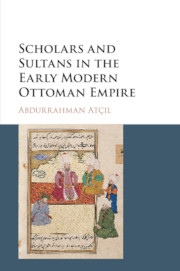Book contents
- Frontmatter
- Dedication
- Contents
- List of Tables
- Notes on Usage
- Acknowledgments
- Introduction
- Part I Scholars during the Early Ottoman Period (1300–1453)
- Part II The Formation of the Hierarchy (1453–1530)
- Part III The Consolidation of the Hierarchy (1530–1600)
- 6 The Focus of Attention Changes
- 7 The Ascendance of Dignitary Scholar-Bureaucrats (Mevali)
- 8 The Growth and Extension of the Hierarchy
- 9 The Rules and Patterns of Differentiation among Scholar-Bureaucrats
- 10 The Integration of Scholar-Bureaucrats in Multiple Career Tracks
- Conclusion
- Glossary
- Bibliography
- Index
6 - The Focus of Attention Changes
from Part III - The Consolidation of the Hierarchy (1530–1600)
Published online by Cambridge University Press: 24 November 2016
- Frontmatter
- Dedication
- Contents
- List of Tables
- Notes on Usage
- Acknowledgments
- Introduction
- Part I Scholars during the Early Ottoman Period (1300–1453)
- Part II The Formation of the Hierarchy (1453–1530)
- Part III The Consolidation of the Hierarchy (1530–1600)
- 6 The Focus of Attention Changes
- 7 The Ascendance of Dignitary Scholar-Bureaucrats (Mevali)
- 8 The Growth and Extension of the Hierarchy
- 9 The Rules and Patterns of Differentiation among Scholar-Bureaucrats
- 10 The Integration of Scholar-Bureaucrats in Multiple Career Tracks
- Conclusion
- Glossary
- Bibliography
- Index
Summary
Early modern imperial state formations displayed two salient characteristics: (1) articulating universal claims and trying to establish “universal” dominion and (2) establishing a centralized imperial bureaucracy that ruled all provinces in the name of the emperor. In the Ottoman case, these two aspects did not always go hand in hand. For example, as discussed in Chapter 5, during Selim I's reign, the rapid territorial expansion in eastern and southern Anatolia, Syria, Egypt, and Arabia was not accompanied by commensurate bureaucratic growth; the local military and civil personnel in place during the pre-Ottoman period were incorporated into the imperial administrative structure. Somewhat similarly, the first decade of Süleyman's reign was marked by the capture of new lands in the east and west, as well as by forceful universalist imperial propaganda, but the bureaucracy did not register corresponding strides. On the other hand, beginning in the 1530s, the desire to strengthen centralized control over the provinces and the drive to create techniques and to train personnel for this became the essential concern of the sultans and their agents, although the assertion of universal prerogatives continued. This shift in emphasis and the attention to augmenting centralized control had important repercussions for the size of the bureaucracy in general and for the standing of scholar-bureaucrats in particular.
Süleyman started his reign with military campaigns and new conquests in the west. He captured Belgrade and Rhodes in 1521–22 and defeated King Louis II of Hungary at Mohács in 1526. These successes brought him into open conflict with two Habsburg brothers, the Holy Roman Emperor Charles V (d. 1558) and the Archduke of Austria Ferdinand (d. 1564), for preeminence in the Mediterranean and Eastern Europe. The Ottoman army besieged Vienna twice, and privateers supported by the Ottoman navy attacked Habsburg possessions and ships in the Mediterranean until the temporary truce of 1533 was signed.
The Ottoman military confrontation with the Habsburgs had an ideological aspect – namely, the contest for imperial titles and rights. Charles V received the title of Holy Roman Emperor in 1519 and declared his right and intention to establish universal rule by uniting Christian Europe and conquering the Ottoman lands.
- Type
- Chapter
- Information
- Scholars and Sultans in the Early Modern Ottoman Empire , pp. 119 - 133Publisher: Cambridge University PressPrint publication year: 2016



